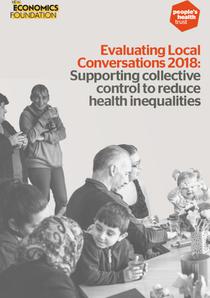Overview
In this first-year evaluation, NEF worked with all Local Conversations projects to support them to develop methods of self-appraisal. It conducted regular surveys of residents across each neighbourhood and carried out detailed case studies in five of those areas.
This report offers a summary of early findings, based on data collected up to August 2017. It draws on the case studies in five neighbourhoods: Govanhill, Glasgow; Claremont Ten Streets in Blackpool, Lozells in Birmingham; Upper Afan Valley in south Wales, and Netherfield in Milton Keynes.
The report found that by coming together, engaging in dialogue and taking action, people in the Local Conversations areas started to achieve some of the shorter-term outcomes modelled in the programme’s theory of change. Most commonly, there are signs of increased social connectedness, and of people gaining greater confidence, as well as knowledge, understanding and skills.
The report also explores challenges facing Local Conversations in the early phase of their projects such as engagement with under-represented communities, and forming local partnerships to achieve greater impact.
“Now the Local Conversation is here, when small changes happen, like the way beds get built, or the shrubbery gets cut down, visible things that people can see happening, I think it enables people to see that if they do come up with an idea there’s no reason why it can’t happen.”
Lead organisation
Netherfield
About the evaluation
New Economics Foundation independently evaluated the Local Conversations programme’s theory of change and its impact from 2016 to 2021. This first year Local Conversations evaluation was published in February 2019.

